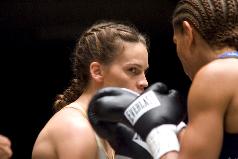
First Saw It:
December 21, 2004, at the Angelika Film Center in New York, NY
 |
Winner '04: First Saw It: |
Million Dollar Baby December 21, 2004, at the Angelika Film Center in New York, NY | ||
|---|---|---|---|---|
| Bridesmaids: | The Aviator, Finding Neverland, Ray, Sideways | |||
| My Vote: | Million Dollar Baby, in a first-round TKO | |||
| Overlooked: | Eternal Sunshine of the Spotless Mind, Maria Full of Grace, Before Sunset |
 |
| Photo © 2004 Warner Bros. Pictures |
| Academy Award Nominations and Winners: | |
| ★ | Best Picture |
| ★ | Best Director: Clint Eastwood |
| ★ | Best Actress: Hilary Swank |
| Best Actor: Clint Eastwood | |
| ★ | Best Supporting Actor: Morgan Freeman |
| Best Adapted Screenplay: Paul Haggis | |
| Best Film Editing: Joel Cox | |
| Golden Globe Nominations and Winners: | |
| Best Picture (Drama) | |
| ★ | Best Director: Clint Eastwood |
| ★ | Best Actress (Drama): Hilary Swank |
| Best Supporting Actor: Morgan Freeman | |
| Best Original Score: Clint Eastwood | |
| Other Awards: | |
| Directors Guild of America: Best Director | |
| New York Film Critics Circle: Best Director | |
| National Society of Film Critics: Best Picture; Best Actress (Swank; tie) | |
| Boston Society of Film Critics: Best Actress (Swank) | |
| National Board of Review: Special Achievement in Filmmaking (Eastwood) | |
| Permalink | Home | 2004 | ABC | Best Pics | Blog |